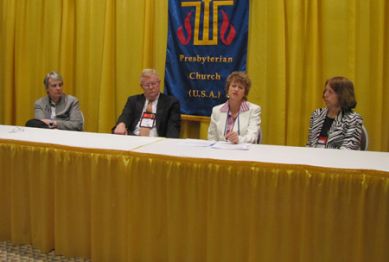PC(USA) Moves Closer to Adopting Belhar Confession

The Presbyterian Church (PC) (U.S.A.) has moved one step closer to adopting the Belhar Confession into its official theological framework, voting overwhelmingly on Wednesday to send the document to consideration by its presbyteries.
Drafted in 1982 in apartheid-era South Africa, the Belhar Confession is a statement focused on the themes of justice, unity and reconciliation.
Among other things, the confession says its purpose and lasting hope is "that the world may believe that separation, enmity and hatred between people and groups is sin," and it rejects any doctrine maintaining that racial or ethnic "descent or any other human or social factor should be a consideration in determining membership of the church."
Delegates at the PC(U.S.A.) 219th General Assembly voted 525-150 to adopt the confession, which now must receive a two thirds approval from the church's 173 presbyteries.
"The Confession of Belhar confesses the Christian faith powerfully, touching hearts especially at those places where we are struggling today to be faithful," reads a PC(U.S.A.) committee report.
The PC(U.S.A.)'s decision comes just weeks after the Reformed Church of America (RCA) officially adopted Belhar as their fourth confessional statement.
The adoption was solidified during the RCA's General Synod in June, and comes after 15 years of consideration.
The RCA's sister church, the Christian Reformed Church of North America, is also considering adopting Belhar, although not all reformed congregants are on the bandwagon yet.
Viola Larson, a PC(U.S.A.) layperson, has noted that several advocates of Belhar support the confession because they believe it strengthens their case on issues such as ordination of homosexual clergy, support for Palestinians in the Middle East conflict, and adoption of a pluralistic viewpoint on faith.
According to Larson, such viewpoints can be taken because the Belhar Confession omits acknowledgement of the Lordship of Christ.
"Unity within the Church always occurs because Christians are united to the Lord of the Church," Larson wrote in her blog in May. "In their union with Jesus Christ they are united to all other believers."
Larson also notes that the omission of Christ's Lordship is the crucial difference between Belhar and the Declaration of Barmen, which was written by theologian Karl Barth in Nazi Germany and is a supposed influence for Belhar.
Barmen supports the concerns addressed by Belhar while "preventing the church from falling into any kind of idolatry or antinomianism," Larson writes.
"It does that by insisting, Biblically, that 'Jesus Christ, as He is attested for us in Holy Scripture, is the one word of God which we have to hear and which we have to trust and obey in life and death.'"
During a press conference on Wednesday, Sharon Stanley of PC(U.S.A.)'s Theological Issues and Institutions Committee noted that the group was aware of the objections to Belhar and that their vote was "well informed."
"We listened very carefully and hear repetitively the concerns that were expressed that might be utilized to support gay and lesbian issues," Stanley said, according to the Layman. "It was very helpful for the committee to hear each of those perspectives, and I think no vote for or against could have been nearly so well informed without the opportunity to hear from each of those sides."
A vote from PC(U.S.A.)'s presbyteries is scheduled to be completed by June 2011.